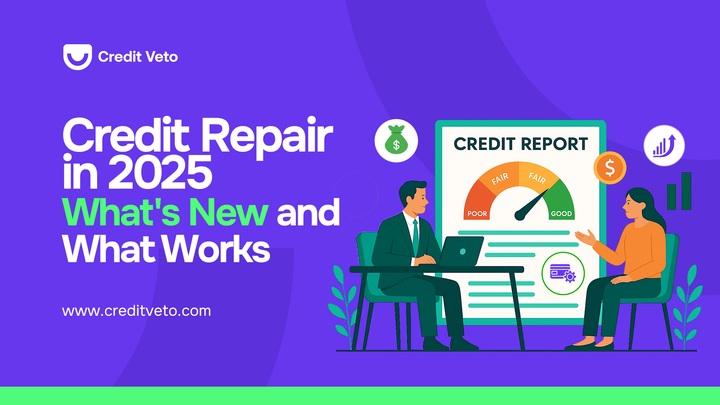Your negative student loan history is hurting your credit report a lot! Learn legal ways to delete student loans, handle defaults, and improve your credit score today
If you’re one of the many individuals with student loans, you might not realize how much they impact your credit score. Whether you’ve recently paid off a loan, defaulted, or are just dealing with a lingering negative history, you may be wondering how to remove student loans from your credit report.
Student loans play a massive role in shaping your credit profile. According to the Consumer Financial Protection Bureau (CFPB) reports, there are over 45 million borrowers in the U.S. with student loan debt. If you’ve missed payments or defaulted, this can have a long-lasting effect on your credit.
Luckily, there are ways to manage your student loan history on your report legally, and with some patience, you can improve your credit score and financial future. In this guide, we’ll walk you through everything you need to know about student loans and credit scores
How Do Student Loans Appear on Your Credit Report?
Student loans show up on your credit report as part of your payment history, which is the largest factor in your FICO score, making up 35% of your credit score. Whether current or in default, these loans are regularly reported to all three major credit bureaus (Experian, Equifax, and TransUnion).
This is because they’re considered a form of installment credit. These loans appear as part of your credit history and can either have a positive or negative impact on your credit score.
- Positive Impact: If you’ve been making on-time payments, this can show lenders that you’re a responsible borrower.
- Negative Impact: Missed payments, defaults, or late student loan payments can drop your score significantly.
According to FICO, 35% of your credit score depends on payment history. Therefore, missed student loan payments can drop your credit score by 50-100 points.
Key Points About Student Loans on Your Credit Report:
- Current status: Whether or not your loan is current, paid, or in default.
- On-time payments: Timely payments contribute positively to your credit score.
- Default or late payments: If your loan is in default or you missed payments, this will negatively impact your credit score.
How Long Do Student Loans Stay on Your Credit Report?
Student loans can stay on your credit report for several years, depending on their status. Here’s the breakdown:
- Late Payments: These can remain on your credit report for up to 7 years from the original missed payment.
- Defaulted Loans: If you default on a student loan, it can remain on your report for 7 years from the date of the default.
- Paid-Off Loans: Even after you pay off your student loans, they may still appear on your credit report as "closed" or "paid in full" for several years.
As of early 2021, around one in five borrowers of student loans were in default on a federal loan, according to the Pew Charitable Trusts. Delinquency and default were widespread even prior to COVID-19.
How to Remove Negative Student Loan History from Your Credit Report
Now, let’s look at how to legally remove negative student loan history from your credit report.
1. Dispute Inaccurate Information
If your credit report reflects incorrect information about your student loans (e.g., late payments when you made the payment on time), you can dispute the errors with the credit bureaus. Here’s how:
- Obtain a copy of your credit report from all three bureaus (Experian, Equifax, and TransUnion).
- Check for inaccuracies: Look for errors such as wrong payment dates, accounts that don’t belong to you, or paid-off loans that still appear as open.
- File a dispute: This can be done online through Credit Veto
- Provide supporting documentation: Include proof of payments (receipts, bank statements, etc.) to show that the information is inaccurate.
Once the credit bureaus receive your dispute, they have 30 days to investigate and respond. If they cannot verify the disputed item, it must be removed.
2. Request a Goodwill Adjustment
If your loans are fully paid, but you have late payments that are damaging your credit, you can request a goodwill adjustment from your loan servicer. This is a request to remove a negative mark based on your overall payment history with the lender, especially if you’ve had an otherwise clean record.
To request a goodwill adjustment:
- Call or email your servicer: Be polite and explain your situation.
- Explain why the negative mark occurred: Maybe you were going through a financial hardship.
- Request the removal of the negative mark.
Note: Goodwill adjustments aren’t guaranteed, but many servicers will remove late marks as a gesture of goodwill, particularly if you’ve been a loyal customer with timely payments afterward.
3. Wait for Negative Marks to Drop Off
If your student loans are in default or have missed payments, you may need to wait for them to expire from your credit report. Negative marks typically stay on your report for 7 years, and you cannot speed up this process.
According to FICO, most negative items (like late payments) take about 7 years to age off your credit report. However, it’s crucial to start building positive credit habits in the meantime so that when the negative marks do fall off, your credit score is on the rise.
How to Handle Paid-Off Student Loans That Are Still on Your Credit Report
Paid-off student loans may still appear on your credit report for several years after you’ve fully settled them. While they won’t hurt your credit score, they may confuse potential lenders and complicate your credit profile.
What to Do:
- Check your credit report regularly to ensure that your loans are accurately marked as paid in full or closed.
- If your student loan is still appearing as open, dispute it with the credit bureaus or contact your loan servicer to update the status.
What If You Still Have Student Loan Debt on Your Credit Report?

If you still owe on student loans, consider these options to help improve your credit score:
1. Set Up Automatic Payments
Missing payments can severely impact your score. By setting up automatic payments, you ensure that your loans are paid on time and that your payment history remains positive. This can help improve your FICO score over time, as on-time payments account for 35% of your score.
2. Refinance or Consolidate Your Loans
If you have multiple student loans, consider refinancing or consolidating them to simplify your payments and potentially lower your interest rates. This may also improve your credit mix, as it adds a different type of credit account to your profile.
3. Look Into Income-Driven Repayment Plans
If you’re struggling to make payments, an income-driven repayment plan can help lower your monthly payments and prevent late payments, which could damage your credit.
Additional Tips to Improve Your Credit with Student Loans
- Check for errors on your credit report regularly.
- Be mindful of your credit utilization on revolving accounts like credit cards.
- Maintain a good payment history on all accounts, not just your student loans.
- Consider working with a credit repair company like Credit Veto for personalized help with disputing errors and improving your credit profile.
Conclusion: Managing Your Student Loan History
Student loans can be a crucial part of your credit history, but they don't have to hinder your financial future. By following the steps in this guide, you can ensure that your credit report accurately reflects your payment history and remove any negative student loan history that’s hurting your score.
If you need help managing your credit or removing negative student loan entries, Credit Veto’s credit monitoring services can help you track your credit health and get personalized recommendations to improve your score.
Take control of your credit today—start working with Credit Veto, follow us on our social media platforms, and become the boss of your financial future.





Comments ()